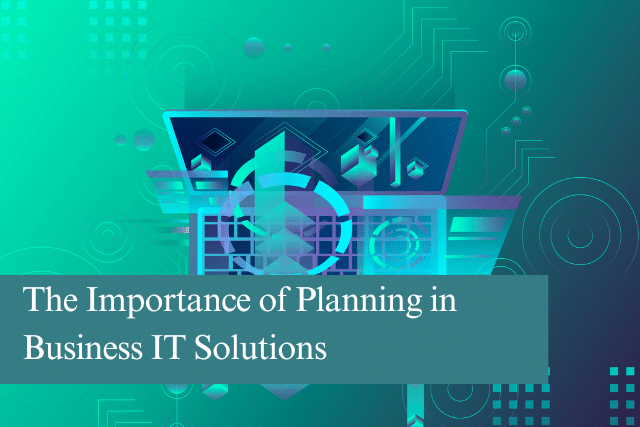
From cloud computing and cybersecurity to data analytics and automation, IT solutions underpin almost every aspect of modern business operations. However, diving headfirst into new technologies without a clear plan can be risky, costly and counterproductive.
This is where the importance of planning in business IT solutions comes into play. A well-thought-out IT strategy not only aligns with your company’s goals but also ensures scalability, security, and long-term success.
Why IT Planning Matters
Whether you’re a small business upgrading your systems or a large corporation undergoing digital transformation, planning ensures that your IT investments are intentional and beneficial. Here’s why strategic planning is crucial:
Aligning IT with Business Objectives
IT solutions are most effective when they are directly tied to the broader business strategy. Proper planning ensures that your technology investments support core business goals whether that’s entering new markets, improving customer service or increasing productivity.
Without this alignment, businesses risk implementing systems that offer little value or worse, disrupt existing workflows.
Cost Efficiency and Budget Control
Planning helps businesses forecast IT expenses and avoid unnecessary costs. It allows for detailed budgeting, which reduces the chance of surprise expenses down the line. You can allocate resources wisely, compare vendors, and avoid overpaying for software or hardware that may not even be used to its full potential.
Ad hoc technology spending often results in duplicated efforts, underused systems, and technical debt.
Risk Management and Security
Cybersecurity threats are more prevalent than ever. A well-planned IT strategy includes robust risk assessments and contingency planning to protect sensitive data and ensure business continuity in case of disruptions.
Planning also ensures that security measures like firewalls, encryption, and regular updates are not an afterthought but an integrated part of the IT infrastructure.
Scalability and Future-Proofing
Business needs evolve, and your IT infrastructure must keep pace. With a solid plan in place, your business can adopt scalable solutions that grow alongside you, rather than needing to start from scratch every few years.
Planning also involves anticipating industry trends and technological advancements, allowing you to stay competitive and future-ready.
Improved Productivity and Efficiency
An IT strategy ensures that systems work in harmony, reducing downtime, streamlining workflows, and eliminating redundancy. Staff can work more efficiently when systems are easy to use, interconnected, and tailored to their specific tasks.
When employees are supported by reliable, well-integrated technology, productivity soars.
Key Elements of an Effective IT Plan
If you’re thinking of developing an IT strategy for your business, here are some essential components that should be included:
- Assessment of current systems: Understand what’s working, what’s not, and where the gaps are.
- Clear business goals: Technology should serve your company’s mission and strategic direction.
- Budget planning: Factor in initial costs, maintenance, training, and scalability.
- Risk management strategy: Prepare for data breaches, system failures, and compliance issues.
- Vendor and partner selection: Work with trusted IT providers who align with your business values.
- Ongoing monitoring and evaluation: Technology evolves so should your strategy.
Common Pitfalls of Poor IT Planning
Businesses that skip the planning phase often encounter a range of avoidable issues:
- System incompatibility: Without a plan, new systems might not integrate with existing ones.
- Inadequate training: Employees are left confused or frustrated, leading to low adoption rates.
- Wasted investment: Money is spent on tools that don’t align with actual business needs.
- Security vulnerabilities: A reactive approach to IT often leads to gaps in cybersecurity.
- Downtime and disruption: Without clear processes in place, even minor IT issues can cause major headaches.
The Role of a Trusted IT Partner
Planning can seem overwhelming, especially if your business doesn’t have a dedicated IT team. That’s where working with a trusted IT solutions provider becomes invaluable. Experts can help you assess your current setup, identify growth opportunities, and design a customised IT roadmap tailored to your needs.
Rather than offering generic solutions, a reputable IT partner will focus on creating a cohesive, strategic plan that evolves with your business and delivers measurable value over time.
Take the Next Step
Effective IT planning is not just about technology it’s about ensuring your business is equipped to thrive in a digital-first world. Whether you’re looking to improve efficiency, enhance cybersecurity, or future-proof your infrastructure, our team is here to help.
Let’s build your IT strategy together.
Contact us today to explore how our tailored IT solutions can support your business goals and set you up for long-term success.
Recommended Posts

IT Simplified: What Is A Firewall?
21st March 2025


